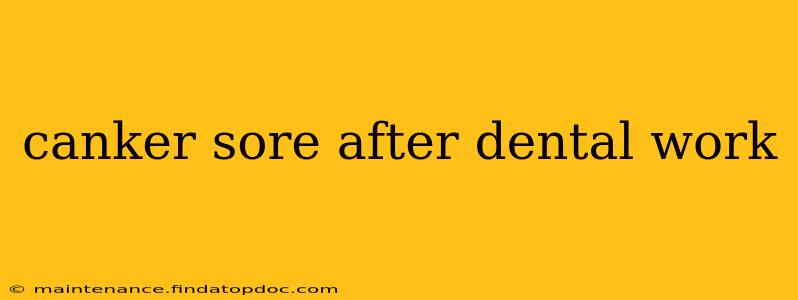Experiencing a canker sore after dental work is unfortunately a common occurrence. These painful, small ulcers inside the mouth can be quite disruptive, especially when you're already recovering from a dental procedure. Understanding why they appear and how to manage them is crucial for a smoother recovery. This comprehensive guide explores the potential causes, effective treatments, and preventative measures to help you navigate this irritating post-dental complication.
What Causes a Canker Sore After Dental Work?
Several factors can contribute to the development of a canker sore after a dental appointment. The most common culprits include:
-
Minor Trauma: Dental procedures, even seemingly minor ones like cleanings or fillings, can cause microscopic trauma to the soft tissues in your mouth. This irritation can trigger the immune system, leading to the formation of a canker sore. The process of inserting instruments, suctioning, or even the slight pressure from cheek retractors can all play a role.
-
Chemical Irritation: Some dental materials, such as certain types of adhesives, composite resins, or even mouthwashes used during or after procedures, might irritate the delicate mucosal lining of your mouth, resulting in a canker sore. Exposure to these substances can trigger an inflammatory response.
-
Stress: Undergoing dental work can be stressful for some individuals. Stress is a known trigger for canker sores in many people, and the added pressure of a dental procedure can exacerbate the problem.
-
Infection (Rare): While less common, an infection following a dental procedure, though typically involving a bacterial infection at the site of the procedure itself, could in rare cases contribute to the development of a canker sore. If you experience a canker sore alongside other signs of infection, consult your dentist immediately.
How Long Does a Canker Sore After Dental Work Last?
The duration of a canker sore after dental work varies depending on its size and severity, as well as your individual immune response. Most canker sores heal naturally within 7-10 days. However, some larger or more severe sores might take a bit longer, up to two or three weeks. If a canker sore persists beyond three weeks, or if you experience worsening symptoms, seek advice from your dentist or a medical professional.
How to Treat a Canker Sore After Dental Work?
While there's no magic cure for canker sores, several home remedies and over-the-counter treatments can help alleviate pain and speed up healing:
-
Rinsing with Salt Water: Gently rinsing your mouth with warm salt water (1/4 to 1/2 teaspoon of salt dissolved in 8 ounces of warm water) several times a day can help cleanse the area and reduce inflammation.
-
Over-the-Counter Pain Relief: Topical anesthetics like Orajel or benzocaine-containing gels can numb the area and provide temporary pain relief.
-
Canker Sore Patches: These medicated patches create a protective barrier over the sore, helping to shield it from irritation and promote healing.
-
Avoid Irritants: During healing, refrain from eating acidic, spicy, or overly hot foods and drinks that might further irritate the sore. Opt for soft, bland foods.
-
Good Oral Hygiene: Maintain meticulous oral hygiene, brushing and flossing gently around the area, to prevent infection.
Can I Use Hydrogen Peroxide on a Canker Sore?
While hydrogen peroxide has antiseptic properties, its use on canker sores is generally discouraged. Hydrogen peroxide can damage the delicate tissues surrounding the canker sore, potentially slowing down the healing process and causing further irritation. Stick to gentler rinsing solutions like warm salt water.
What Should I Do if I Have a Canker Sore After a Filling?
If you develop a canker sore after getting a filling, it’s important to contact your dentist. They can assess the situation, rule out any complications related to the filling, and provide appropriate advice and treatment. In most cases, the canker sore is unrelated to the filling itself but a result of the procedure's minor trauma or irritation.
When Should I See a Dentist for a Canker Sore?
While most canker sores resolve on their own, it's advisable to consult your dentist if:
- The sore persists for more than three weeks.
- The sore is unusually large or painful.
- You experience signs of infection such as fever, swelling, or pus.
- You have multiple canker sores simultaneously.
- You have underlying health conditions that might affect healing.
Preventing Canker Sores After Dental Work
While you can't always prevent canker sores entirely, you can take steps to minimize your risk:
-
Manage Stress: Practice stress-reducing techniques like meditation, yoga, or deep breathing exercises.
-
Maintain Excellent Oral Hygiene: Regular brushing and flossing are essential to prevent any minor irritation that could trigger a canker sore.
-
Inform Your Dentist of Existing Conditions: If you have a history of canker sores, inform your dentist beforehand so they can take extra precautions during the procedure. They might suggest using a special mouth rinse or taking other preventive measures.
By understanding the causes, treatments, and preventative measures discussed here, you can effectively manage any canker sores that may arise after dental work and ensure a smoother recovery. Remember to always consult your dentist if you have any concerns.
